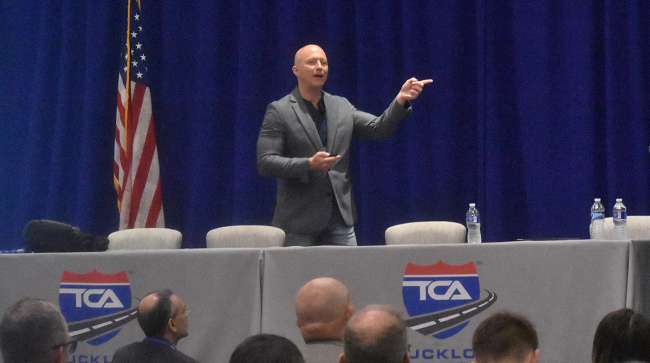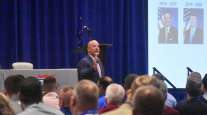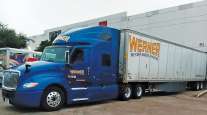Senior Reporter
Trucking Attorneys Need to Get Aggressive, Expert Says

[Stay on top of transportation news: Get TTNews in your inbox.]
INDIANAPOLIS — Litigation psychologist Bill Kanasky has a few rather frank words of advice for truckers and their attorneys facing potential nuclear verdicts: Get in the game early, get more aggressive and prepare your defense witnesses so that they don’t say something dumb in depositions.
Truckers should know that plaintiff attorneys in trucking-involved crashes are the “bad guys who exploit the system” and will strike hard and fast in a lawsuit, according to Kanasky, a longtime observer of courtroom tactics as senior vice president of litigation psychology at Courtroom Sciences Inc.
“The transportation industry is in the crosshairs of the plaintiffs’ bar, a very well coordinated, oiled, highly effective destructive machine,” he said.
“The odds are they’re planning that the defense won’t be ready,” Kanasky told a large group of executives attending a June 2 session at the Truckload Carriers Association’s Safety and Security Meeting. “The trucking industry needs a major, major change in philosophy to get more aggressive. Your world is changing.”
As for plaintiff attorneys, Kanasky said they have been very open, publicly stating that their objectives are to go after the big money in lawsuits.

“That’s how arrogant they are,” he said. “The first step to getting nuclear verdicts or nuclear settlements is attacking your witnesses, your corporate reps, your safety directors, your heads of HR, your drivers, ripping them to shreds. That’s in a deposition, it’s on video and an incredible amount of economic leverage going forth. That’s the first step.”
Then they do a lot of testing of their cases with mock juries to figure out if they have a winner, Kanasky said.
“They figure it out before your legal team figures it out,” he said. “Then we’re in the first quarter of the football game and the score is 21-0. If you learn one thing, learn this: You’ve got to win the battle in these depositions.”
If not, then plaintiff attorneys will seek excessive demands, he added.
Robby Hamby of Bridgestone Americas and Ken Eggen of Wolf River Express share how fleets should acquire the right tire monitoring tools for data collection. Tune in above or by going to RoadSigns.ttnews.com.
“They have figured out everything about the case, and you don’t have a clue about it,” Kanasky said. “Some of them think why take the settlement money — go to the courtroom, get a massive nuclear verdict.”
Such legal moves by plaintiff attorneys have been called the “reptile method,” a tactic that attempts to convince juries that in accidents with trucks, they need to send messages with large verdict awards.
Truckers commonly express concerns about lawyers on billboards trying to solicit clients involved in accidents with large trucks. But Kanasky says they’re not the worst problems. They tend to move on after getting quick settlements that are much smaller than those the more serious plaintiff attorneys are looking for.
“They’re beatable. You just have to know how to play the game,” he said. “What they do is increase the number of claims, but they don’t increase nuclear verdicts.”
Kanasky said bad depositions are preventable, but there are a number of reasons that truckers get into trouble during depositions that can virtually guarantee a nuclear verdict. Some of them include:
- Problem witnesses who are unable to answer the difficult questions that plaintiff attorneys use to lead them down a dangerous path
- An ineffective witness testimony strategy when a trucking witness is argumentative and tries to win the deposition
- An emotional witness who gets easily upset during questioning
- A witness who has a “cognitive breakdown”
“These plaintiff attorneys are good,” Kanasky said. “They’re relentless from day one. They do good jury research. They’re very aggressive with witnesses. They openly share information with each other. They are absolutely fanatics.”
Want more news? Listen to today's daily briefing below or go here for more info:





